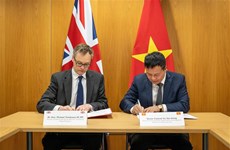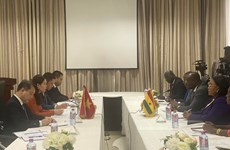US House holds hearing on AO
The US House of Representatives' Subcommittee on Asia, the Pacific and the Global Environment held a hearing
on AO in VN on July 15.
The Subcommittee on Asia, the Pacific and the Global Environment of the
US House of Representatives' Committee on Foreign Affairs held a hearing
on Agent Orange (AO) in Vietnam, in Washington on July 15.
"It's a good hearing," said Eni Faleomavaega, Chairman of the subcommittee.
In an interview with Vietnam News Agency's reporter in the US, Congressman Faleomavaega added that the testimonies and answers given by Matthew Palmer, Acting Deputy Assistant Secretary of the US Department of State's Bureau of East Asian and Pacific Affairs; and John Wilson, Director of the Office of Technical Support under US Agency for International Development's Bureaus for Asia and the Middle East, helped US congressmen be better educated and better informed of the US-Vietnam cooperation in addressing the problems relating to AO victims in Vietnam, so that US law makers could have more information in considering more funding for relating programmes.
Faleomavaega, who called and presided over the first US Congress hearing on Agent Orange in Vietnam in May 2008 and the second in June 2009, described the testimony by Nguyen Thi Ngoc Phuong, Vice Chairwoman of the Vietnam Association for Victims of AO/Dioxin (VAVA), as scientifically great, and that by Tran Thi Hoan, a Vietnamese AO victim as informative about the lives of Vietnamese AO victims as well as their call to international communities. He said the two Vietnamese witnesses helped the people in the US in general and US congressmen in particular get more interest into consequences of AO/dioxin.
In his testimony before the Subcommittee, Matthew Palmer said over the last several years, the United States has worked with Vietnam to ensure that its AO activities align with Vietnamese health and environmental objectives. “This cooperation has brought us closer than ever to the permanent elimination of dioxin at Danang Airport due to AO and has allowed us to provide much-needed assistance to vulnerable populations," he said.
The Acting Deputy Assistant Secretary added: "AO has long been a sensitive topic in US-Vietnam relations, and we have had some past challenges reaching agreement on how and where to cooperate, but we are now transforming dialogue into tangible improvements in the environment and health of the people of Vietnam."
He reaffirmed that: "The United States Government has demonstrated a firm commitment on working to find a resolution to this lingering concern and to ensuring the continued improvement of US-Vietnam relations."
A memorandum sent by the US Congressional Research Service to the sponsor Subcommittee wrote: "The Vietnamese government has sought US Agent Orange-related assistance since the two nations reestablished diplomatic recognition 15 years ago. Initially, the U.S. Government denied any legal liability to provide assistance, and questioned Vietnam's assertions about the extent of environmental and health problems associated with AO/dioxin."
According to the congressional agency, the US stance on the issue created some tensions in bilateral relations, though not enough to prevent greatly expanded diplomatic, economic and military relations.
Taking the floor of the hearing, John Wilson said that despite economic growth, Vietnam still faces significant environmental and development challenges, including dioxin contamination "hotspots" at various locations around the country. He added: "While we celebrate the progress that we have made over the past 15 years, we also recognise that the US can do more, including with respect to dioxin remediation, which will have a significant benefit to our bilateral relations."
The official from the US Agency for International Development called the Congress for continuous commitment to dioxin remediation in Vietnam and called on the US to "be a leader on this issue and make a significant impact on the lives of many Vietnamese."
The VAVA Vice Chairwoman Ngoc Phuong called on US congressmen to continue the work begun by the US veterans groups and other American NGOs to decisively heal the wounds of war for Vietnam's more than 3 million AO/dioxin victims by providing resources for comprehensive medical services, regular care, rehabilitation and educational services and facilities; as well as with funding to remediate those areas in Vietnam that continue to contain high level of dioxin to stop as soon as possible exposure for people living around those "hot spots"; and requiring those chemical companies which manufactured AO to recognise responsibility and assist the victims.
She stressed that: "Timely and effective actions taken by the US Congress to help victims of AO/dioxin in Vietnam are the final steps in healing the wounds of war as our two peoples and nations continue to build a relationship of friendship and peace."
Phuong, who has twice attended US Congress hearing on AO/dioxin in Vietnam, told Vietnam News Agency's reporter that the invitation of a VAVA representative and a Vietnamese AO victim to attend the third hearing reflected some changes in the US side's attitude on the link between AO and the health of people in Vietnam.
Being Vietnam's first AO victim invited to US Congress hearing, the 23-year-old Hoan expressed the hope that US chemical manufacturers which made the AO and the US government who sprayed and dumped the toxic substance in Vietnam should do the right thing to help victims of terrible consequences of AO. She stressed, "It is a matter of justice and humanity".
She called on the US people and their representatives to reach out hands in friendship and understanding to help make dreams of having a family, getting a job and having a peaceful life by young AO victims in Vietnam come true./.
"It's a good hearing," said Eni Faleomavaega, Chairman of the subcommittee.
In an interview with Vietnam News Agency's reporter in the US, Congressman Faleomavaega added that the testimonies and answers given by Matthew Palmer, Acting Deputy Assistant Secretary of the US Department of State's Bureau of East Asian and Pacific Affairs; and John Wilson, Director of the Office of Technical Support under US Agency for International Development's Bureaus for Asia and the Middle East, helped US congressmen be better educated and better informed of the US-Vietnam cooperation in addressing the problems relating to AO victims in Vietnam, so that US law makers could have more information in considering more funding for relating programmes.
Faleomavaega, who called and presided over the first US Congress hearing on Agent Orange in Vietnam in May 2008 and the second in June 2009, described the testimony by Nguyen Thi Ngoc Phuong, Vice Chairwoman of the Vietnam Association for Victims of AO/Dioxin (VAVA), as scientifically great, and that by Tran Thi Hoan, a Vietnamese AO victim as informative about the lives of Vietnamese AO victims as well as their call to international communities. He said the two Vietnamese witnesses helped the people in the US in general and US congressmen in particular get more interest into consequences of AO/dioxin.
In his testimony before the Subcommittee, Matthew Palmer said over the last several years, the United States has worked with Vietnam to ensure that its AO activities align with Vietnamese health and environmental objectives. “This cooperation has brought us closer than ever to the permanent elimination of dioxin at Danang Airport due to AO and has allowed us to provide much-needed assistance to vulnerable populations," he said.
The Acting Deputy Assistant Secretary added: "AO has long been a sensitive topic in US-Vietnam relations, and we have had some past challenges reaching agreement on how and where to cooperate, but we are now transforming dialogue into tangible improvements in the environment and health of the people of Vietnam."
He reaffirmed that: "The United States Government has demonstrated a firm commitment on working to find a resolution to this lingering concern and to ensuring the continued improvement of US-Vietnam relations."
A memorandum sent by the US Congressional Research Service to the sponsor Subcommittee wrote: "The Vietnamese government has sought US Agent Orange-related assistance since the two nations reestablished diplomatic recognition 15 years ago. Initially, the U.S. Government denied any legal liability to provide assistance, and questioned Vietnam's assertions about the extent of environmental and health problems associated with AO/dioxin."
According to the congressional agency, the US stance on the issue created some tensions in bilateral relations, though not enough to prevent greatly expanded diplomatic, economic and military relations.
Taking the floor of the hearing, John Wilson said that despite economic growth, Vietnam still faces significant environmental and development challenges, including dioxin contamination "hotspots" at various locations around the country. He added: "While we celebrate the progress that we have made over the past 15 years, we also recognise that the US can do more, including with respect to dioxin remediation, which will have a significant benefit to our bilateral relations."
The official from the US Agency for International Development called the Congress for continuous commitment to dioxin remediation in Vietnam and called on the US to "be a leader on this issue and make a significant impact on the lives of many Vietnamese."
The VAVA Vice Chairwoman Ngoc Phuong called on US congressmen to continue the work begun by the US veterans groups and other American NGOs to decisively heal the wounds of war for Vietnam's more than 3 million AO/dioxin victims by providing resources for comprehensive medical services, regular care, rehabilitation and educational services and facilities; as well as with funding to remediate those areas in Vietnam that continue to contain high level of dioxin to stop as soon as possible exposure for people living around those "hot spots"; and requiring those chemical companies which manufactured AO to recognise responsibility and assist the victims.
She stressed that: "Timely and effective actions taken by the US Congress to help victims of AO/dioxin in Vietnam are the final steps in healing the wounds of war as our two peoples and nations continue to build a relationship of friendship and peace."
Phuong, who has twice attended US Congress hearing on AO/dioxin in Vietnam, told Vietnam News Agency's reporter that the invitation of a VAVA representative and a Vietnamese AO victim to attend the third hearing reflected some changes in the US side's attitude on the link between AO and the health of people in Vietnam.
Being Vietnam's first AO victim invited to US Congress hearing, the 23-year-old Hoan expressed the hope that US chemical manufacturers which made the AO and the US government who sprayed and dumped the toxic substance in Vietnam should do the right thing to help victims of terrible consequences of AO. She stressed, "It is a matter of justice and humanity".
She called on the US people and their representatives to reach out hands in friendship and understanding to help make dreams of having a family, getting a job and having a peaceful life by young AO victims in Vietnam come true./.













